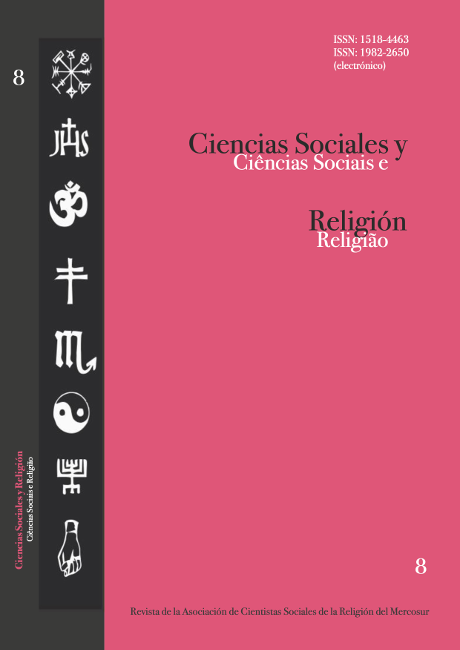Abstract
Just as in the time of her beginning, the Christian Congregation ofBrazil continues to propagate herself by personal networks and by cult as uniqueways of marketing. Leaders are prohibited to be political candidates, and in thecult there is no place for political propaganda. These facts prove that the CCBkeeps herself aside some religious, cultural and social dynamics which had impacton nearly all contemporary religious groups, with other pentecostals at the frontline.Therefore, the CCB continues what their first scholars already affirmed about her:a pentecostalism sui generis. The present paper analyses the relations of power withinthis religious group, his competitive strategies, and his lack of participation inparty politics. It looks for the devices in his memory and collective representationsthat block the transformations which are occuring in other religious groups.
References
BARRERA RIVERA, Dario Paulo. Tradição, memória e modernidade: a precariedade da memória religiosa contemporânea. Estudos da Religião São Bernardo do Campo, ano XIV, no 18, p. 121-144, jun. 2000.
BARRERA RIVERA, Dario Paulo. Tradição, transmissão e emoção religiosa. Sociologia do protestantismo contemporâneo na América Latina. São Paulo: Olho d’Água, 2001.
CORRÊA, Manoel Luiz G. As vozes prementes: o discurso religioso da Congregação Cristã no Brasil. 2a ed., Campinas: Editora Unicamp, 1989.
CUCCHIARI, Salvatore. Adapted for heaven: conversion and culture in western Sicily. American Ethnologist, Washington, vol. 15, p. 417-441,ago. 1988.
CUCCHIARI, Salvatore. Between shame and santification: Patriarchy and its transformation in Sicilian Pentecostalism. American Ethnologist, Washington, vol. 17, p. 687-707, nov. 1990.
D’EPINAY, Christian Lalive. O refúgio das massas. Rio de Janeiro: Paz e Terra, 1970.
DURKHEIM, Emil. De la division du travail social. Paris: Alcan, 1893.
EINHORN, Lois J. The native American oral tradition: voices of the spirit and soul. Westport/Londres: Praeger, 2000.
ESQUIVEL, Juan Cruz. Igreja católica e Estado na Argentina e no Brasil. Notas introdutórias para uma análise comparativa. Ciencias Sociales y Religión / Ciências Sociais e Religião. Porto Alegre, ano 5, n. 5, p.191-223, out. 2003.
EVANS-PRITCHARD, Edward. The Nuer of the southern Sudan. In: FORTES, Meyer e EVANS-PRITCHARD, Edward (Ed.). African political systems. New York: Oxford University Press, p.272-296, 1940a.
EVANS-PRITCHARD, Edward. Nuer Religion. New York and Oxford: Oxford University Press, 1956.
EVANS-PRITCHARD, Edward. The Nuer: A description of the modes of livelihood and political institutions of a nilotic people. Oxford: Clarendon Press, 1940b.
FORTES, Meyer e EVANS-PRITCHARD, Edward (Ed.). African political systems. New York: Oxford University Press, 1940.
HALBWACHS, Maurice. A memória coletiva. São Paulo: Vértice, 1990.
HALBWACHS, Maurice. Les Cadres Sociaux de la Mémoire. Paris: Albin Michel, 1994.
LÉONARD, Émile G. J. O iluminismo num protestantismo de constituição recente. São Bernardo do Campo: Pós-Graduação em Ciências da Religião, 1988.
MAGNANI, José Guilherme Cantor. Festa no pedaço: Cultura popular e lazer na cidade. 2a ed. São Paulo: Hucitec, 1998.
MAGNANI, José Guilherme Cantor e TORRES, Lilian de Lucca. Na metrópole. Textos de antropologia urbana. São Paulo: Edusp, 2000.
MARIANO, Ricardo. Neopentecostais: Sociologia do novo pentecostalismo no Bra-sil. São Paulo: Loyola, 1999.
MASFERRER KAN, Elio. ¿Es del César o es de Dios? Un modelo antropológico del campo religioso. México: Centro de Investigaciones Interdisciplinarias en Ciencias y Hu- manidades y Plaza y Valdés, 2004.
MENDONÇA, Antônio Gouvêa. Pentecostalismo e as concepções históricas de sua classificação. In: SOUZA, Beatriz Muniz de; GOUVEIA, Eliane Hojaij; JARDILINO, José Rubens Lima (Orgs.). Sociologia da religião no Brasil: Revisitando metodologias, classificações e técnicas de pesquisa. São Bernardo do Campo e São Paulo: UMESP, PUCSP e ASTE, 1998.
MIDDLETON, John e TAIT, David. Introduction. MIDDLETON, John e TAIT (Ed.). Tribes without rulers. Londres, Routledge & Kegan Paul, 1958, pp. 1-32.
NELSON, Reed Elliot. Análise organizacional de uma Igreja Brasileira: A Congregação Cristã no Brasil. Revista Eclesiástica Brasileira, Petrópolis, vol. 44, fasc. 175, 1984, p. 544-558.
SYLVESTRE, Josué. Irmão vota em irmão: os evangélicos, a Constituinte e a Bíblia. Brasília: pergaminho, 1986.
WEBER, Max. Economia e Sociedade: Fundamentos da sociologia compreensiva. Tradução: Regis Barbosa e Karen Elsabe Barbosa. Volume 1. Brasília: UnB, 1991.
WEBER, Max. Grundriß der Sozialökonomik. III. Abteilung. Wirtschaft und Gesellschaft. Tübingen: J.C.B Mohr (Paul Siebeck) 1922. In: Max Weber im Kontext: Werke auf CD-ROM. Berlin: Karsten Worm - InfoSoftWare, 1999.
WILLAIME, Jean Paul. La prècarité protestante: Sociologie du protestantisme contemporain. Genebra: Labor et Fides, 1992.
YUASA, Key. Louis Francescon: A theological biography. 1866-1964 (Edição revisada). Tese (Doutorado em Teologia), Faculté Autonome de Théologie Protestante de l’Université de Genève, Genebra, 2001.

This work is licensed under a Creative Commons Attribution-NonCommercial-ShareAlike 4.0 International License.
Copyright (c) 2020 Norbert Hans Christoph Foerster
